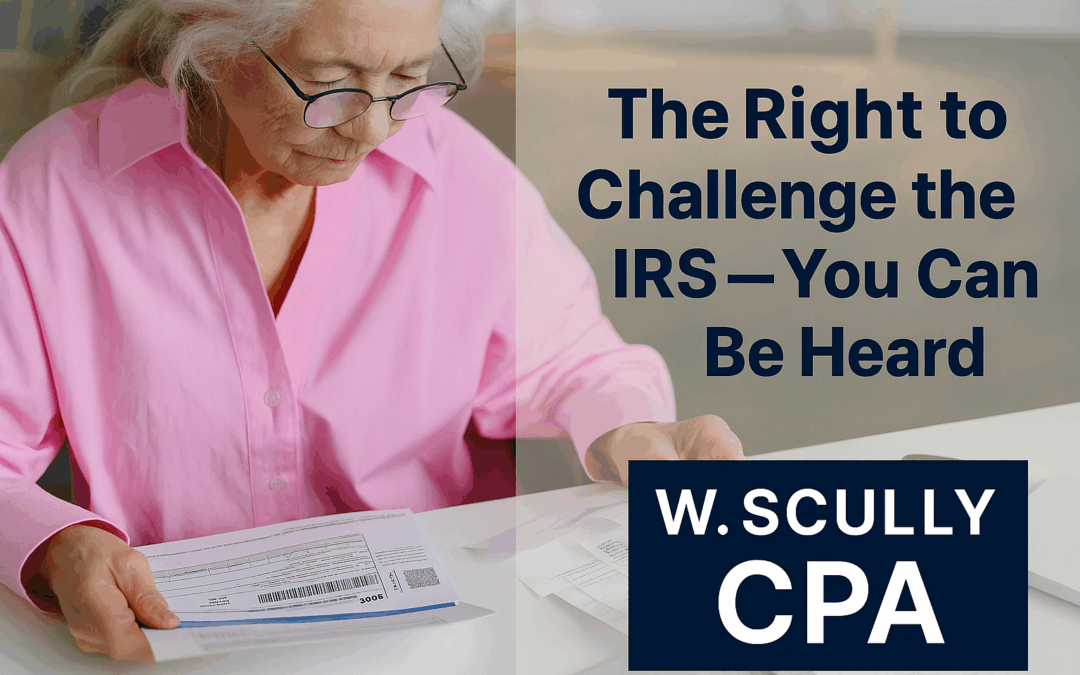
A retired taxpayer carefully reviewing her IRS documents — symbolizing confidence, accuracy, and the right to challenge IRS errors.
🧾 The Right to Challenge the IRS — You Can Be Heard
When you get a letter from the IRS, it’s easy to feel powerless — like your fate has already been decided.
However, here’s the truth: you have the right to challenge the IRS when you believe they’ve made a mistake.
The IRS is not infallible. In many cases, however, I’ve seen countless cases where an IRS adjustment or penalty notice was simply wrong — however, because the taxpayer never responded or didn’t know how to challenge it, the balance became final and collectible.
💡 Understanding Your Right to Challenge the IRS
To begin with, under the Taxpayer Bill of Rights, you have the legal right to:
-
Object to IRS actions or proposed changes you disagree with.
-
Present documentation and facts that support your position.
-
Expect the IRS to review your challenge fairly and promptly before enforcing additional tax, penalties, or levies.
That means if you get a Notice of Deficiency, CP2000, or audit report, you don’t just have to accept it. Therefore, you have the right to respond, explain, and be heard — before the IRS finalizes the amount owed.
🧩 Real Example: When the IRS Got It Wrong
For instance, one of my West Coast clients, Mr. Turner, is retired and living on pension income.
In 2020, she made an honest mistake on her tax return — she accidentally entered her retirement income on the wage line.
The IRS systems didn’t see any employer-reported wages for her that year, but instead of recognizing that, they automatically sent a CP2000 notice claiming she underreported income.
The IRS said she owed $20,375 in additional tax — money she did not owe.
They had essentially double-counted her pension, treating it as both unreported income and taxable wages.
So, when Ms. Turner reached out, we reviewed the notice and her return.
We prepared a clear written response showing that no employer wages existed and that her pension had already been properly reported.
As a result, the IRS corrected their error, reduced the tax bill to just over $400, and formally closed the case. Listen how we made her “Cry Tears of Joy“.
Simply put, this situation was completely avoidable. The IRS should have internal checks to confirm whether a taxpayer truly has wage income before issuing a CP2000 — but until that happens, your right to challenge is your safety net.
🕓 Deadlines Matter
Equally important, if you plan to challenge an IRS notice, timing is everything.
Thus, most letters give you 30 days (sometimes less) to respond.
What’s more, miss that window, and the proposed balance becomes final — and collection action can begin.
Consequently, it’s so important not to ignore correspondence. Even if you’re unsure what to say, a prompt, well-crafted response can stop penalties and buy time to present your case properly.
🧭 How to Challenge the IRS Effectively
So, to make things easier, here’s a simple process I recommend:
-
Read the notice carefully — Identify the code (e.g., CP2000, CP14, LT11).
-
Compare their data with yours — Look for mismatches, duplicates, or missing information.
-
Gather your evidence — W-2s, 1099s, pension forms, or any supporting documentation.
-
Respond clearly and professionally — Address the specific issue, include copies (never originals), and send it certified mail.
-
Get help if needed — A CPA or other qualified tax resolution specialist can ensure your response hits every key point.
So, remember: being assertive is not the same as being combative. You’re simply exercising your legal right to fairness.
⚖️ The Bottom Line
In summary, the IRS doesn’t get the final word — you do.
So, every taxpayer has the right to challenge a proposed tax adjustment and to have that challenge reviewed before collection begins.
Even so, that right only protects you if you use it.
Because of this, if you receive a notice you don’t agree with, don’t ignore it and don’t panic — get informed, get documentation, and respond the right way.
✅ Need Help Responding to the IRS?
Therefore, if you’ve received an IRS notice and aren’t sure what it means, don’t guess — get clarity.
At W. Scully, CPA, P.C. and Tax Resolution Experts of America, we help taxpayers interpret IRS letters, respond correctly, and avoid unnecessary interest and penalties.
👉 Click to book a confidential consultation today;
👉 Or call us directly at (718) 938-4601 or visit W. Scully, CPA, P.C.
Want more blog content? Find more here
Connect with me, everywhere:
Fill out the form below to connect with us now:
[contact-form][contact-field label=”Name” type=”name” required=”true” /][contact-field label=”Email” type=”email” required=”true” /][contact-field label=”Website” type=”url” /][contact-field label=”Message” type=”textarea” /][/contact-form]

